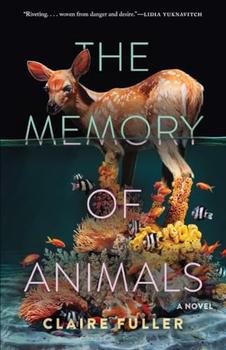Summary | Excerpt | Reviews | Beyond the book | Read-Alikes | Genres & Themes | Author Bio

The End We Start From is a debut literary novel penned in a lyrical style similar to a journal. Water imagery flows throughout, connecting an amniotic dream-state of pregnancy, birth, and nursing with a cataclysmic flood that displaces millions of people from London and the surrounding area. The first-person narrator never names herself; in this sense she's an archetypal everywoman or, more specifically, an archetypal new mother. She refers to other characters by initials. Her beloved is R and their infant son will be named Z.
Under the surface, this is a flow-of-consciousness story about the terrors of new motherhood, recounting the emotional, physical, and spiritual adjustments one makes. The exterior plot is a survival struggle, where a young family escapes their flooded London flat, seeking refuge in a series of more or less risky situations. These two strands of narrative are braided with fragments of myth. "At first there was only the sea, only the sky. From the sky came a rock, which dropped deep into the sea. A thick slime covered the rock, and from this slime words grew."
The novel spans about a year, but time doesn't flow precisely by any calendar reckoning. Scenes are elliptical, poetic, and often drift past days, or even weeks. One reason this style works is that Megan Hunter pays exquisite attention to detail and imagery. Another reason is that this is disaster fiction. In a disaster, characters don't keep track of their lives in the same ways that used to matter. Memory bestows brief flashbacks, but never enough to interrupt the onward momentum of the survival struggle.
After evacuating their London flat, the family moves in with R's parents, N and G, in a rural, hilly region. Readers are tumbled into an urgent and sensual realm. While N and G and R listen to news downstairs, the narrator nurses newborn Z. "Words float up the stairs like so many childhood letter magnets. Endgame, civilization, catastrophe, humanitarian." R begins to build a cabin in his parents' backyard, but supplies dwindle and this requires forays to re-provision. During one excursion, G disappears. During another, N is lost. The narrator spends days alone worrying after her beloved R fails to return from a shopping trip.
Long hours nursing an infant lull her into a flow state, her awareness of current events muted, numbed by the imperatives of breast-feeding. She makes a tentative truce with solo parenting. "The car arrives when I am not watching or listening. I am asleep in the soaking light of our bedroom, with Z sprawled on my belly, snuffling into motherflesh. We are beasts in the sun. We are, for seconds, oblivious."
R returns, then organizes another urgent retreat, for unspecified reasons. They still have a vehicle, but it's not clear how R has managed to fill it with fuel and provisions. They decide to stay at an evacuation center, but there's a sense of scarcity, displacement, and danger surging. Eventually, R departs to scout out a better place. The narrator is left to her own choices, and reliance on new friendships formed through shared adversity. "I go and sit with them. They are the husbandless. They are the milk drippers, the exhausted ones, with hair streaked with grey and rips in the knees of their jeans." In a world where in-laws can permanently disappear on a shopping trip, the narrator yearns for the return of her absent husband. Tension is enhanced because in this world, there are no working cell phones; communications consist of primitive person-to-person exchanges, wanderer's tales, gossip.
Weeks pass. Z learns to push himself up and to speak. The narrator befriends a woman and her daughter. They flee the refugee camp, pass through a series of threatening situations, and embark on a boat destined for an island that offers a rural, commune-like idyll. All the while, the narrator holds hope of reunion with R. "Then there are flowers poking up in the garden, and Z is crawling."
The End We Start From, which is longlisted for the 2018 Aspen Words Literary Prize, shares the shelf with other tales of war and survival. In this case the enemy is natural disaster and the quest is for a return to normal. Home will never seem the same, even if they're able to repopulate; trauma will resonate even if R and the narrator find each other after displacement. I'm not going to spoil the plot here, but much of what kept me riveted to this novel is the exquisite, poetic language. Hunter's settings, imagery, and characters conspire to deliver a cinematic, if sometimes fragmented reading experience, absent of actual dialogue. The book is recommended to those who like their fiction literary and poetic with strong motherhood themes and a tender, understated love story.
![]() This review was originally published in The BookBrowse Review in January 2018, and has been updated for the
October 2018 edition.
Click here to go to this issue.
This review was originally published in The BookBrowse Review in January 2018, and has been updated for the
October 2018 edition.
Click here to go to this issue.

If you liked The End We Start From, try these:

by Emma Pattee
Published 2025
Set over the course of one day, a heart-racing debut about a woman facing the unimaginable, determined to find safety.

by Claire Fuller
Published 2024
From the award-winning author of Our Endless Numbered Days, Swimming Lessons, Bitter Orange, and Unsettled Ground comes a beautiful and searing novel of memory, love, survival—and octopuses.
Your guide toexceptional books
BookBrowse seeks out and recommends the best in contemporary fiction and nonfiction—books that not only engage and entertain but also deepen our understanding of ourselves and the world around us.